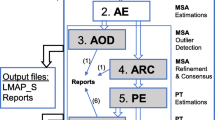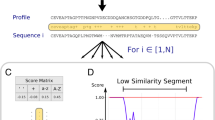Introduction
Multiple sequence alignment (MSA), which is of fundamental importance for comparative genomics, is a difficult problem and error-prone. Therefore, it is essential to measure the reliability of the alignments and incorporate it into downstream analyses. Many studies have been conducted to find the extent, cause and effect of the alignment errors [4], and to heuristically estimate the quality of alignments without using the true alignment, which is unknown [2]. However, it is still unclear whether the heuristically chosen measures are general enough to take into account all alignment errors. In this paper, we present a new alignment reliability score, called PSAR (Probabilistic Sampling-based Alignment Reliability) score.
Access this chapter
Tax calculation will be finalised at checkout
Purchases are for personal use only
Similar content being viewed by others
References
Durbin, R., Eddy, S.R., Krogh, A., Mitchison, G.: Biological sequence analysis: probabilistic models of proteins and nucleic acids. Cambridge University Press, Cambridge (1998)
Penn, O., et al.: An alignment confidence score capturing robustness to guide tree uncertainty. Mol. Biol. Evol. 27(8), 1759–1767 (2010)
Siepel, A., et al.: Evolutionarily conserved elements in vertebrate, insect, worm, and yeast genomes. Genome Res. 15(8), 1034–1050 (2005)
Wong, K.M., et al.: Alignment uncertainty and genomic analysis. Science 319(5862), 473–476 (2008)
Author information
Authors and Affiliations
Editor information
Editors and Affiliations
Rights and permissions
Copyright information
© 2011 Springer-Verlag Berlin Heidelberg
About this paper
Cite this paper
Kim, J., Ma, J. (2011). PSAR: Measuring Multiple Sequence Alignment Reliability by Probabilistic Sampling. In: Bafna, V., Sahinalp, S.C. (eds) Research in Computational Molecular Biology. RECOMB 2011. Lecture Notes in Computer Science(), vol 6577. Springer, Berlin, Heidelberg. https://doi.org/10.1007/978-3-642-20036-6_14
Download citation
DOI: https://doi.org/10.1007/978-3-642-20036-6_14
Publisher Name: Springer, Berlin, Heidelberg
Print ISBN: 978-3-642-20035-9
Online ISBN: 978-3-642-20036-6
eBook Packages: Computer ScienceComputer Science (R0)




